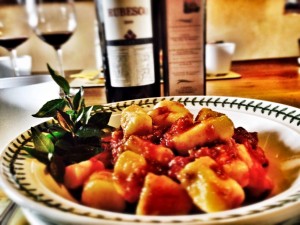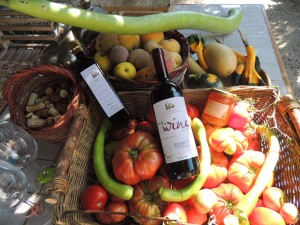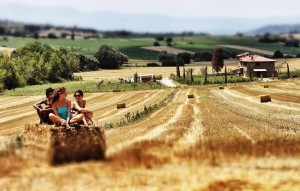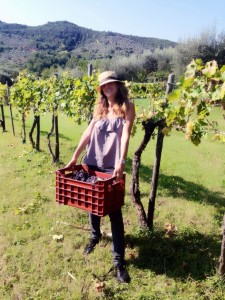 During the early summer of 2014, I spent about 40 days “on the road” in Italy, descending the entire peninsula from North to South. I started in Lake Como and ended in Messina, Sicily, with dozens of stops along the way.
During the early summer of 2014, I spent about 40 days “on the road” in Italy, descending the entire peninsula from North to South. I started in Lake Como and ended in Messina, Sicily, with dozens of stops along the way.
About ten days into the trip I realized, to my horror, that I had grossly underestimated the degree of stamina required for such a tour-de-force, especially with a 9-month old baby on board. To put it plainly, I was exhausted and not looking forward to another whirlwind spin through yet another charming hill town (oh, the sacrifices I make for my blog). And I still had three weeks to go. (What’s the saying about “the best laid plans”?)
It was a chilly, rainy night when at last I arrived at Fontanaro and to the hospitality of Alina Pinelli. She must have sensed my exasperation. We were welcomed with wine and pasta and a genuine warmth and concern for our comfort. That meal was a fabulous blur, but after a good night’s sleep, I woke the next morning to a splendid sunrise and the full panorama of Fontanaro’s glory.
The front door of our villa spilled out onto a rolling, green countryside, like every postcard you’ve seen of rustic Italian bliss. Alina greeted us again (this time with coffee and fresh pastries from her kitchen), and we took a lazy stroll around the property as she explained the workings of her organic farm.
 I had all kinds of questions. What exactly does it mean to be “organic,” anyway? And who verifies this? What about other distinctions, such as D.O.C.G. and D.O.P.?
I had all kinds of questions. What exactly does it mean to be “organic,” anyway? And who verifies this? What about other distinctions, such as D.O.C.G. and D.O.P.?
One could almost be forgiven for overlooking these details, given the entire country’s reputation for culinary excellence. But no, the more that I learned about the importance of organic farming and seasonal, local ingredients, the more I became aware that many Italian producers, restaurants, and foodie destinations in Italy use their culture’s exalted reputation to take advantage of less-informed tourists.
At Fontanaro, they don’t just “talk the talk.” They live it; it’s part of their history, and indeed the food and the recipes are part of their family.
OK, I should just shut up and let Alina tell her own story. Here you go…
Hi, I’m Alina Pinelli. I’m 38 years-old, and I was born and raised in Rome. But all of my vacations and most of my free time was spent here, at Fontanaro, my eco farm on the border between Tuscany and Umbria.
Since I was little, I loved to eat and to learn how to cook. I remember being in the kitchen with my nonna Loredana from Trieste, who raised 6 children during the Second World War.
She was the princess of the home; everything was always perfect with her magic touch. She was able to cook incredible dishes with only a few ingredients. From her I took my passion for cooking.
I remember her making Arvortoli, a typical Umbrian snack (similar to pancakes) made only with natural flour, olive oil, sugar and a pinch of salt, served with our organic honey or just with some sugar.
This is a very old recipe from the poor farmers of Umbria who couldn’t buy so much. It was considered a real treat, and who doesn’t have some flour, water, sugar and olive oil in the kitchen?
Also my mum was a great chef, but with less time to cook. Together with my father, while I was with nonna, she worked hard to restore the farm where I live now, which is a real stone farmhouse from 1893. When they bought it in 1976, it was in ruins and without a roof!
 I remember my summers playing the “war of tomatoes” with my cousins Domitilla, Cesare, Roberto and Camilla, spending all the day alone with them, and playing among our hills! It was fun, the best childhood I can imagine, and from sunrise to sunset we were free to go exploring.
I remember my summers playing the “war of tomatoes” with my cousins Domitilla, Cesare, Roberto and Camilla, spending all the day alone with them, and playing among our hills! It was fun, the best childhood I can imagine, and from sunrise to sunset we were free to go exploring.
And when we arrived back home, we had to set the table and help nonna in the kitchen.
These days at Fontanaro, it is not so different from the past; the olive oil, grapes, honey and saffron are like before. It’s part of our agriculture. But with more knowledge, our family took this passion seriously, converting the old farmhouse into a working agriturismo. We transformed the hobby of “country slow living” into our business.
Now I’m a professional wine and olive oil sommelier, and my mother is, too. In winter, I build on my culinary knowledge by taking advanced classes in Rome. This year, I’m also enrolled in master classes from the University in Rome on Nutrition and Dietology.
I’m very happy that the Honorary President of the National Association of Dietology and Nutrition, Mr. Eugenio Del Toma, thinks that it is really important to follow the guidelines of the Mediterranean Diet, based on extra virgin olive oil.
The object of our country slow living experience is to find the balance between nutrition, environment, and wellness, as the Greeks Hippocrates and Euscalapio mentioned in their studies centuries ago.
 So there’s nothing new under the stars! Only knowledge and attention, which I’m so happy and proud to share with my guests and friends!
So there’s nothing new under the stars! Only knowledge and attention, which I’m so happy and proud to share with my guests and friends!
Eating is not a matter only of food, but is part of our happiness, we think here at my family.
And most importantly is eating healthy. This is what we promote during our cooking classes through our Extra Virgin Organic Olive Oil tasting lesson. Olive oil is not just a condiment, but also has functional objective. It contains vitamins A, E, K, D and B-carotene, and it helps to assimilate the vitamins from vegetables.
A good extra virgin organic olive oil contains three times more polyphenols than an industrial brand. Extra virgin olive oil is one of the few ingredients that everybody in the world can tolerate—not ONE person in the world has Olive Oil allergies!
We have signs of the olive tree even before the appearance of the man, as evidenced by the fossilize remains. The olive was also a symbol of peace in the Holy Scriptures, and as a symbol of victory and divine essence in the culture of Ancient Greece.
Ansel Keys (1904 – 2004), American biologist and physiologist, is our “partono” of the “dieta mediterranea.” His studies on the diet habits of the people of southern Italy gave birth to the term “Mediterranean Diet.” In particular, Keys deepened the relationship between nutrition and cardiovascular disease, and during his residence in Cilento, he studied the beneficial effects of the diet on the health of the local population. Keys concluded that such habits had a beneficial effect on health, as compared to diets absent of these ingredients in other regions of the Western world.
If the Mediterranean diet is now part of Unesco Patrimonium, perhaps this means that we really should follow the “recipes” of the past and eat more like our grandfathers instead of the prepared meals, take-away, junk food, or so-called comforts foods of today.
With the help of Rick, I’ve assembled some of these recipes for you in a little eBook. I hope that you enjoy them as much as my family has enjoyed them over the years. Buon Appetito!

Ps non name is supposed to be Nonna
I nod my head as I read everything Alpina has to say from her strong non name to her perfect childhood to Mediterranean way of eating. Great post.
Thanks Lyn. Yeah, I think it’s important to invite other voices onto my blog. Like you, I also found myself agreeing, but would not have been able to provide the same perspective. Hope you enjoy the recipes! Rick
I have traveled to France for 10 years and each trip I am wowed with the intense taste of foods from organic farming. There is such a contrast in flavors from the produce we often find in US. In April, I start a 12 week trip through Italy and can’t wait to sample Italy’s organic farming. Great post! Nance
Thanks, Nance. Yes, you bring up a good point that often gets lost in the US: generally speaking, seasonal organic foods TASTE better! We get so caught up in try to tweak our diet “formula,” that we forget to buy higher quality foods NOT just for the health benefits, but also for more enjoyment (which is healthier, too)! Enjoy your trip! Rick
” Let your food be your medicine
and that the medicine be your food ”
Hippocrates
In few words…we are what we eat!
For us, to be organic means not to treat food with chemicals, pesticides and additives!
YES!!! The Greeks knew this centuries ago! Why is it so hard to understand today???
Thanks Rick…it’s simply the amount of care that goes into the growing and cooking that I love so much about how Italians approach eating! And I have learned so much from our many visits to Italy that has impacted how I cook these days!
Totally agree. The only thing I’d add is that the “care” that goes into the food is “normal,” and not really seen as going above and beyond. Thanks so much for your input, Phyllis!!
If you don’t know what organic is and you live anywhere but Italy you’re in trouble.
This is super delicious! Thanks for sharing!
Prego!!